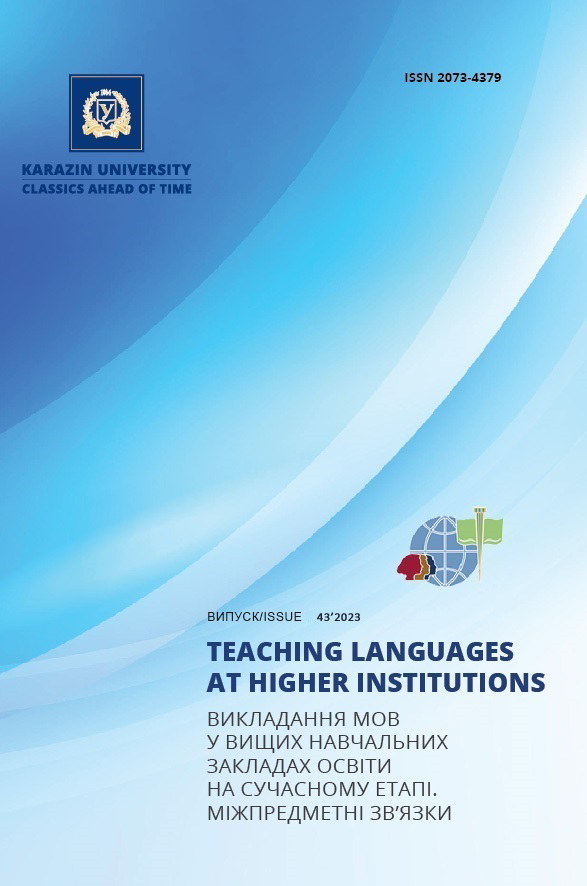Contrastive approach in teaching Ukrainian as a foreign languagе
Abstract
The article continues a series of studies dedicated to teaching the Ukrainian language to foreign students who either know or have experience in studying Russian. This group comprises foreigners from post-Soviet countries, as well as foreign master’s and postgraduate students who previously studied in Ukrainian higher education institutions in Russian. In compliance with the Law on Education, they are now studying Ukrainian or learning it as the state language of their current country of study.
The mastery of a new foreign language, as is commonly known, is built upon existing speaking experience, which determines the methodological necessity of comparing the systems of the known language with the language being studied. Such a comparative analysis allows the identification of common features in both languages and facilitates the application of previously acquired knowledge and skills in learning a new foreign language. Interference, understood as the interaction of different language systems, directly impacts the acquisition of a new language system. The foundation for studying and regulating interference processes lies in the contrastive approach. Contrastive linguistics aims to identify differences and similarities between modern languages, aiding in determining the directions of interference and explaining the cause of typical errors.
In our previous articles, we explored interference effects when Russian-speaking foreigners studied the Ukrainian language, focusing on phonetics, grammar, and syntax. These studies involved a comparative analysis of the functional-communicative organization of sentences, exemplified by the examination of ways to express subject-predicate relations in Ukrainian and Russian.
Functional-communicative grammar emphasizes the pivotal role of syntax as a system that organizes all other language levels. It views a sentence from a communicative organizational perspective as an utterance formed according to a specifically defined structural scheme, with the structural core being the predicate. The predicate designates specific positions for the participants in the situation described by the proposition (subject names or actants) and their quantity.
The proposed article investigates various types of extenders for the predicative centre of sentences, considers primary methods of expressing object, meaning, and circumstantial relations in both simple and complex sentences, and highlights key differences in expressing these relations between Ukrainian and Russian. These differences merit the attention of Russian-speaking learners to prevent interference errors.
The methodical recommendations provided herein may prove beneficial to teachers and methodologists in developing training programs, crafting textbooks, and designing teaching materials for Ukrainian language instruction tailored to specific groups of foreign learners. They also serve as valuable resources for novice teachers in preparing for practical classes.
Downloads
References
Amiantova, E.I., Bitehtina, G.A., Vsevolodova, M.A., Klobukova, L.P. (2001). Funkcionalno-kommunikativnaya lingvodidakticheskaya model yazyka kak odna iz sostavlyayushih sovremennoj lingvisticheskoj paradigmy (stanovlenie specialnosti “Russkij yazyk kak inostrannyj”) [Functional-communicative linguodidactic model of language as one of the components of the modern linguistic paradigm (the development of the specialty “Russian as a Foreign Language“]. Bulletin of Moscow University, Series 9. Philology. 6, pp. 215–233 [in Russian].
Biej, L.B., Trostynska, O.M. (2009). Osoblyvosti navchannia ukrainskoi movy inozemnykh studentiv na Skhodi Ukrainy. Mova i kultura [Features of Teaching Ukrainian to Foreign Students in the East of Ukraine]. Mova i kultura. [Language and Culture]. Kyiv: Vydavnychyi dim Dmytra Buraho, 11, Vol. 1 (113), pp. 356–365 [in Ukrainian].
Biej, L.B., Trostynska, O.M. (2008). The Challenges of Teaching Ukrainian to Various Categories of Foreign Citizens. Teaching Languages at Higher Educational Establishments at the Present Stage. Intersubject Relations. 12, pp. 48–59 [in Ukrainian].
Vajnrajh, U. (1979). Yazykovye kontakty [Language Contacts]. Kyiv: Vyshcha shkola [in Russian].
Dudoladova, A.V. (2014). Problema interferentsii u metodytsi ta praktytsi vykladannia inozemnoi movy [The Issue of Interference in the Methodology and Practice of Teaching a Foreign Language]. Teaching Languages at Higher Educational Establishments at the Present Stage. Intersubject Relations. 24, pp. 41–47 [in Ukrainian].
Reformatskij, A.A. (2019). Lingvistika i poetika [Linguistics and Poetics]. Moscow: Izd-vo Yurajt [in Russian].
Shvedova, N.Yu. (Ed.). (1982). Russkaya grammatika [The Russian Grammar]. Vols. 1-2, Vol. 2 “Syntax”. Moscow: Nauka [in Russian].
Ponomariv, O.D., Rizun, V.V., Shevchenko, L.Yu., et al. (1997). Suchasna ukrayinska mova [Modern Ukrainian]. Ponomareva, O.D. (Ed.). Kyiv: Libid [in Ukrainian].
Trostynska, O.M., Kozhushko, I.A. (2014). The Problems of Training Future Teachers of the Ukrainian Language for Foreigners. Teaching Languages at Higher Educational Establishments at the Present Stage. Intersubject Relations. 25, pp. 58–65 [in Ukrainian].
Trostynska, O.M. (2011). Specifics of teaching a course „Ukrainian language (for professionals)” to foreign students. Theory and Practice of Teaching Ukrainian as a Foreign Language]. 6, pp. 92–97 [in Ukrainian].
Trostynska, O.M. (2015). Comparative Method in Teaching the Ukrainian Grammar to Russian-speaking Foreigners. Teaching Languages at Higher Educational Establishments at the Present Stage. Intersubject Relations. 27, pp. 108–117 [in Ukrainian].
Trostynska, O.M., Tarlieva, A.W. (2017). Comparative analysis of the expression of subject-predicate relations in Ukrainian and Russian languages. Teaching Languages at Higher Educational Establishments at the Present Stage. Intersubject Relations. 30, pp. 131–142 [in Ukrainian].
Sherba, L.V. (2020). Prepodavanie inostrannyh yazykov v srednej shkole. Obshie voprosy metodiki [Teaching Foreign Languages in Secondary School: General Aspects of Methodology]. Moscow: Izd-vo Yurajt [in Russian].

